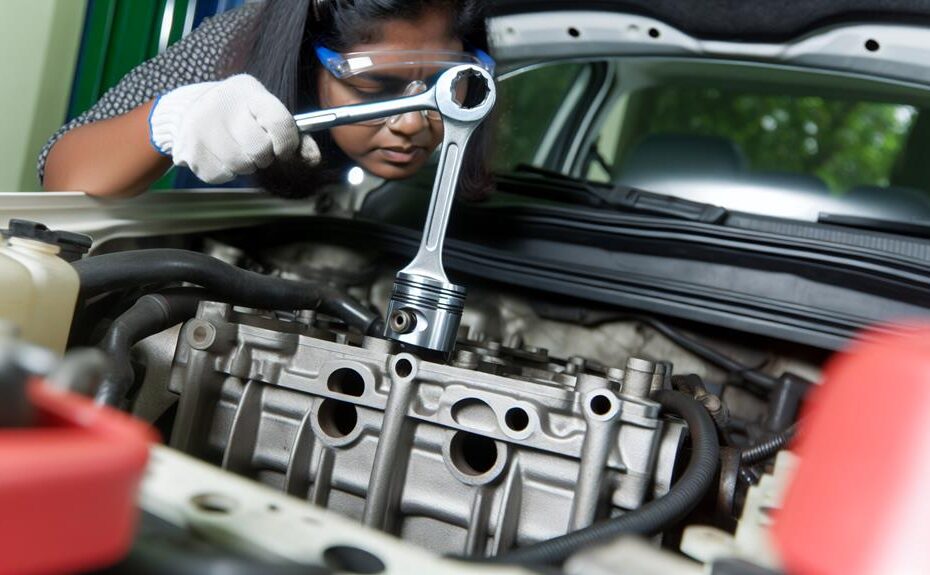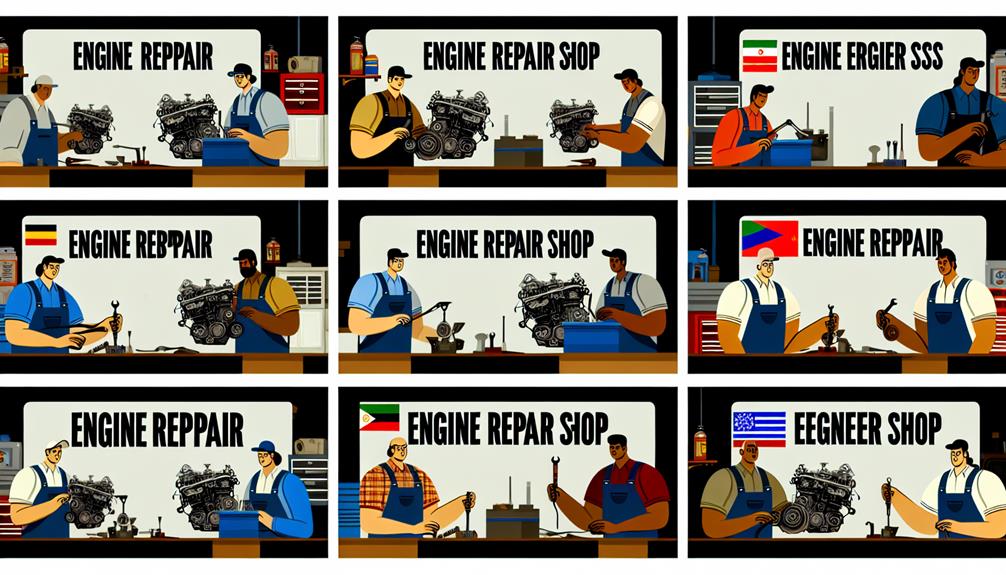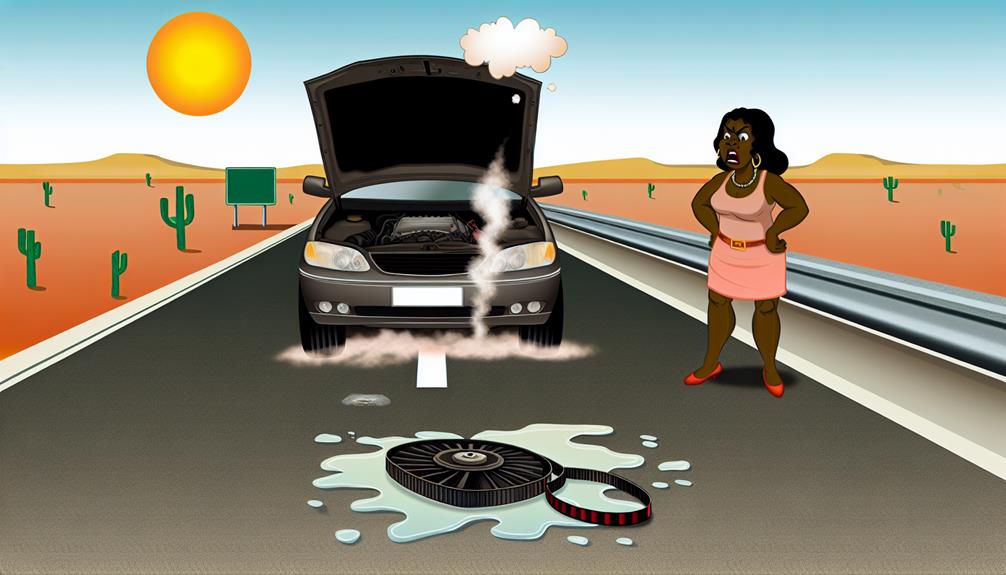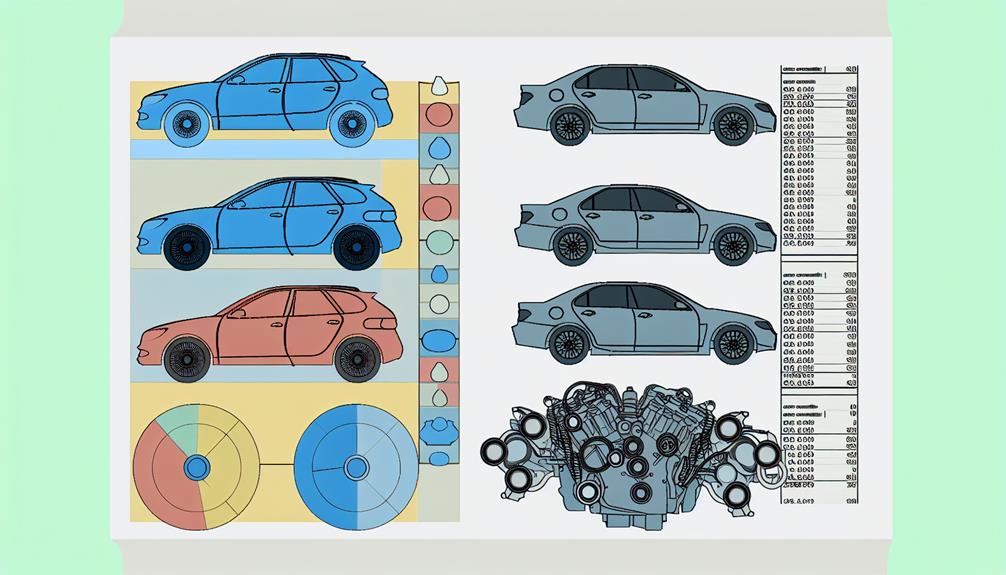Have you ever experienced that annoying knocking sound coming from your car's engine? You're not alone. According to a recent study, engine knocking is one of the most common problems faced by car owners, affecting nearly 20% of vehicles on the road.
But fear not, because in this step-by-step guide, we will walk you through the process of silencing that engine knocking once and for all. So, if you're tired of the constant racket and want to get back to smooth, quiet driving, stick around – we've got you covered.
Key Takeaways
- Engine knocking can be caused by low-quality fuel, carbon deposits, faulty ignition timing, or spark plugs.
- It is important to inspect fuel quality and check for carbon deposits on the combustion chamber walls to identify the cause of engine knocking.
- Steps to reduce engine knocking include optimizing engine performance, using fuel additives, using high-quality fuel, and regular maintenance.
- Repairing engine components such as spark plugs, fuel injectors, ignition timing, and cooling systems can help eliminate engine knocking.
Diagnosing the Engine Knocking Noise
To accurately diagnose the engine knocking noise, you should carefully listen for any irregular sounds while the engine is running. Engine knocking, also known as detonation, is a common issue that can have various causes. It's important to identify the signs and symptoms to pinpoint the underlying problem.
One of the most common causes of engine knocking is low-quality fuel. If you use gasoline with a low octane rating, it can lead to premature ignition and result in knocking sounds. Another cause can be carbon deposits on the combustion chamber walls, which can create hot spots and cause the fuel to ignite before it should. Additionally, a faulty ignition timing or a malfunctioning spark plug can also contribute to engine knocking.
When diagnosing engine knocking, listen for a distinct knocking sound that resembles metal hitting metal. The noise may become more pronounced under acceleration or heavy load. It's important to pay attention to any other accompanying symptoms such as reduced engine power, rough idling, or increased fuel consumption.
Identifying the Cause of Engine Knocking
To identify the cause of engine knocking, carefully inspect the fuel quality and check for carbon deposits on the combustion chamber walls.
When it comes to engine knocking, it's important to understand the common symptoms and potential damages associated with this issue. Engine knocking is often characterized by a knocking or pinging sound coming from the engine, especially during acceleration or under load. This knocking noise can be a sign of several underlying problems that need to be addressed promptly to prevent further damage to your engine.
One possible cause of engine knocking is low-quality fuel. Poor fuel quality can lead to incomplete combustion, causing the fuel to ignite prematurely and result in knocking. Inspecting the fuel quality and ensuring that you're using the recommended octane rating for your engine can help alleviate this problem.
Another potential cause of engine knocking is carbon deposits on the combustion chamber walls. Over time, carbon deposits can build up on the walls of the combustion chamber, altering the combustion process and leading to knocking. Regular maintenance, such as using fuel additives or performing carbon cleaning, can help prevent or remove these deposits.
Identifying the cause of engine knocking is crucial to addressing the issue effectively. By carefully inspecting the fuel quality and checking for carbon deposits, you can take the necessary steps to resolve the problem and avoid potential damages to your engine.
Steps to Reduce Engine Knocking
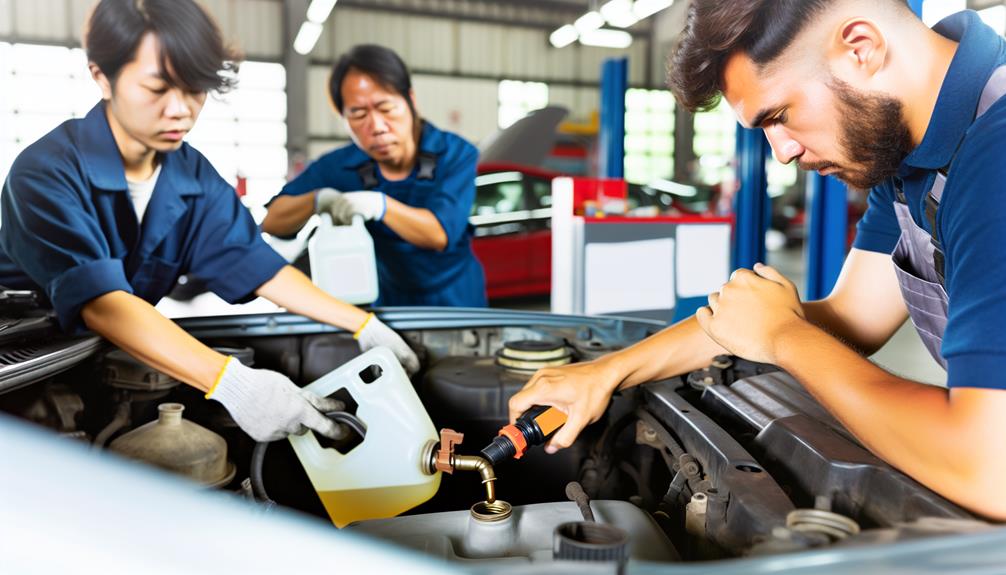
Reducing engine knocking can be achieved by implementing a few key steps in your maintenance routine.
One of the most important steps is engine tuning. This involves adjusting various parameters such as air-fuel mixture, ignition timing, and idle speed to optimize the engine's performance and reduce knocking. It's recommended to consult an experienced mechanic or use a specialized tuning software for best results.
Another effective way to reduce engine knocking is by using fuel additives. These additives are specifically designed to improve the quality of the fuel and enhance its combustion properties. They can help prevent knocking by reducing carbon buildup, improving fuel stability, and lubricating the engine components. Look for additives that contain detergents, antioxidants, and octane boosters for maximum effectiveness.
In addition to engine tuning and fuel additives, it's important to use high-quality fuel that meets the manufacturer's specifications. Using lower octane fuel than recommended can lead to knocking, so always check the owner's manual for the recommended fuel grade.
Regular maintenance is also crucial in reducing engine knocking. This includes regular oil changes, replacing spark plugs, and cleaning or replacing air filters. Keeping the engine clean and well-maintained will help prevent carbon deposits and other issues that can contribute to knocking.
Repairing Engine Components to Eliminate Knocking
Repairing engine components is essential for eliminating engine knocking and restoring optimal performance. To prevent engine knocking, it's important to address the underlying issues causing the problem. The first step is to identify the common symptoms of engine knocking, such as a knocking or pinging sound coming from the engine, decreased power and acceleration, or increased fuel consumption. Once you have identified these symptoms, you can start the repair process.
Start by inspecting the spark plugs and replacing any that are worn or damaged. Faulty spark plugs can cause incomplete combustion in the engine, leading to knocking.
Next, check the fuel injectors for any clogs or leaks. Dirty or malfunctioning fuel injectors can disrupt the fuel-air mixture and result in knocking.
Another crucial component to examine is the ignition timing. Incorrect timing can cause the fuel to ignite at the wrong time, leading to knocking. Adjust the timing according to the manufacturer's specifications to ensure proper combustion.
Additionally, check the engine's cooling system to ensure that it's functioning properly. Overheating can contribute to knocking by causing the fuel to ignite prematurely. Ensure that the coolant levels are sufficient and that the radiator and cooling fans are working efficiently.
Preventive Maintenance to Avoid Engine Knocking
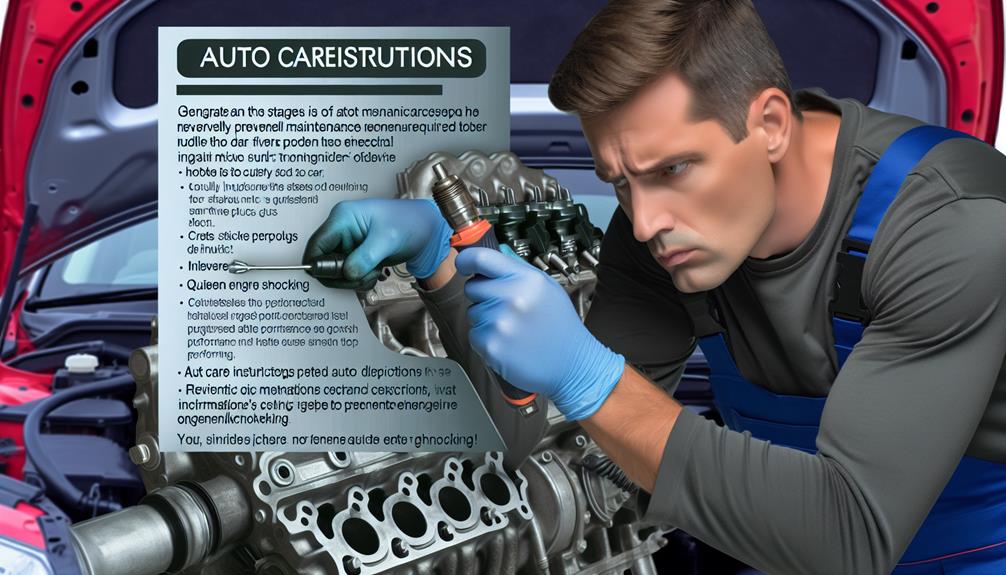
Regular preventive maintenance is crucial for avoiding engine knocking and ensuring optimal performance. By staying proactive and taking care of your vehicle, you can prevent engine knocking and avoid costly repairs down the line.
One key aspect of preventive maintenance is detecting engine knock early on. Engine knock, also known as detonation, occurs when the air-fuel mixture in the combustion chamber ignites spontaneously and causes a knocking sound. This can happen due to various reasons, including incorrect fuel octane rating, carbon buildup in the combustion chamber, and excessive engine heat.
To prevent engine knock, start by using the correct fuel octane rating recommended by your vehicle manufacturer. This will ensure proper combustion and prevent knocking. Regularly cleaning the combustion chamber and intake valves will help prevent carbon buildup, which can lead to engine knocking. Additionally, maintaining proper engine temperature by checking the cooling system regularly can help avoid overheating and subsequent knocking.
Frequently Asked Questions
How Much Does It Cost to Repair Engine Components to Eliminate Knocking?
Are you tired of that irritating knocking sound coming from your engine? Wondering how much it will cost to fix? Professional repairs for engine knocking can range from a few hundred to several thousand dollars, depending on the specific components that need to be replaced. Common causes of engine knocking include worn-out bearings, faulty fuel injectors, or low-quality gasoline. Don't let the cost hold you back from a smooth-running engine. Get it fixed and enjoy the liberation of a quiet ride.
Can Engine Knocking Cause Any Long-Term Damage to the Engine?
Engine knocking can have long-term effects on your engine. It can damage internal components, reduce engine performance, and lead to costly repairs. Addressing engine knocking promptly is crucial for preserving your engine's health and performance.
Are There Any DIY Methods to Reduce Engine Knocking?
To improve engine performance and reduce knocking, there are DIY methods you can try. These methods can help you address the issue without professional assistance, giving you the freedom to take control of your engine's health.
Can Using a Higher Octane Fuel Prevent Engine Knocking?
Using a higher octane fuel can potentially prevent engine knocking by reducing the likelihood of pre-ignition. It is important to consider alternative fuel options and consult your vehicle's manual for the recommended octane level.
How Often Should Preventive Maintenance Be Performed to Avoid Engine Knocking?
To avoid engine knocking, you should perform preventive maintenance at regular intervals. This frequency depends on factors such as the age and condition of your vehicle. Implementing engine knocking prevention techniques will help ensure optimal performance and liberation from costly repairs.
Conclusion
In conclusion, by following the steps outlined in this guide, you can effectively silence engine knocking and prevent further damage to your vehicle.
Remember to diagnose the issue, identify the cause, and take the necessary steps to reduce knocking.
With proper maintenance and repairs, you'll ensure the smooth and efficient operation of your engine.
Don't let engine knocking go unnoticed – take action now to keep your vehicle running at its best.
